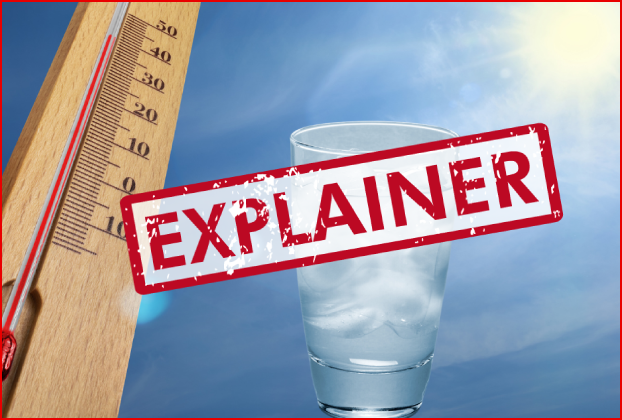Due to the prevailing high temperatures in Sri Lanka, it is important to be vigilant about your health, especially those who have health problems. Extreme hot weather can be dangerous, and recently there have been reports of heatstroke causing people to faint and even sometimes causing deaths. Unfortunately, we also encounter misleading information that is spread on social media, sometimes shared with the good intentions of educating the public.
Social Media Posts
Several Facebook users have shared a warning message about dealing with hot weather, as seen below.
“* Be prepared for the next heat wave *between 40 to 50 °C. Always drink room-temperature water slowly. Avoid drinking cold or ice water! Currently, Malaysia, Indonesia, Singapore, India (as well )are experiencing a “heat wave.”
These are the do’s and don’ts:
1. * Doctors advise not to drink very cold water when the temperature reaches 40 ° C, as our small blood vessels may burst. *
It was reported that a doctor’s friend came home from a very hot day – he was sweating profusely, and he wanted to cool himself quickly – he immediately washed his feet with cold water… Suddenly, he collapsed & was taken to hospital.
2. When the heat outdoors reaches 38 ° C and when you come home, don’t drink cold water – drink only warm water slowly.
Do not wash your hands or feet immediately if they are exposed to the hot sun. Wait at least half an hour before washing or showering.
3. Someone wanted to cool down from the heat and immediately took a shower. After the shower, the person was taken to hospital with a stiff jaw & had a stroke.”

As this text has been widely shared, we have conducted further investigations. We searched for various studies regarding these claims to see if there are any reports of symptoms similar to those mentioned, such as heat stroke caused by drinking cold water in a high-temperature environment.
Expert Opinions
According to Dr. Richard Santos, President of the Philippine College of Emergency Medicine, the above post contains some correct information yet creates a false link between stroke and drinking cold water in hot weather. In an interview with AFP, he explained that cold water can cause blood vessels to constrict as a physiological response to cold stimulation. However, there is no evidence linking drinking cold water directly to stroke, whether caused by blocked or ruptured blood vessels.
Moreover, Dr. Santos stressed that it is important to stay hydrated when staying in a high-temperature environment for a prolonged period of time during the hot season. There is a risk of dehydration, so it is recommended to drink enough water. Even though drinking cold water may be risky for people with pre-existing medical conditions, this is quite uncommon, and the likelihood of experiencing negative effects from drinking cold water is minimal.
Furthermore, Dr. Santos advises social media users not to follow the advice that suggests “letting the body heat up.” Instead, he explains that one should limit the time spent in high-temperature environments. Our bodies can regulate temperature by being in a high-temperature environment for no more than 30 minutes to an hour. Therefore, if staying in a high-temperature environment for an extended period, it is necessary to cool down the body immediately to reduce temperature.
Dr. Jose Paciano Reyes, a neurologist, and president of the Philippine Neurological Association, stated that blood vessels in the brain will not rupture upon contact with cold temperatures. He explained that immersing oneself in cold water or taking sudden cold showers may lead to “Cold Shock,” which can cause loss of control of breathing, constricted blood vessels, and a sudden increase in blood pressure.
Drinking cold water and taking a shower “is usually not a problem for people who are healthy,” according to Dr. Reyes. Drinking cold water has benefits such as cooling the body, preventing excessive heat, and reducing inflammation. However, Dr. Reyes warns that drinking cold water immediately after being in a high-temperature environment may not be a good idea for people with certain ailments, such as heart disease, as it may increase their risk of heart disease and stroke. This is due to an increase in blood pressure and the heart working too hard. (Read more about this here).
Dr. Carla Robinson is a family physician and medical malpractice specialist in North Carolina. She works as a media consultant and medical writer for the Centers for Disease Control and Prevention (CDC). According to Dr. Robinson, when feeling too hot, you can relieve symptoms by drinking cold water or cooling down the body with cold water. In an interview with wcnc.com, she also stated that headaches or dizziness due to extreme heat are often caused by heat exhaustion or heat stroke, not from cold drinks.
Last year, due to hot weather conditions in the US, these messages were widely circulated. Dr. Robinson explained the truth about the misunderstanding in this video.
Meanwhile, in Thailand, Dr. Jessada Denduangboripant, the lecturer of the Biology Program at the Faculty of Science, Chulalongkorn University, has disputed the widely shared message mentioned above, stating that the message is misleading. He explained that “Our body has a mechanism to maintain body temperature close to 37 degrees Celsius. Therefore, even on extremely hot days, if we drink cold water, we may feel a chill as the cold water moves through the esophagus. If the water is too cold, the brain will command blood vessels to contract and muscles to shiver to adjust the body temperature back to 37 degrees Celsius.”
However, there were even a couple of deaths recently reported in Sri Lanka. Both the cases had a history of heart ailments, yet doctors state that exposure to extreme heat and the heat shocks amplified these effects, causing the death. Hence it’s extremely important to minimize exposure to direct sunlight during this unprecedented heat wave, which is expected to last for at least the end of May in Sri Lanka.
Self-care during Extreme Heat
That said, we reiterate that it is extremely important to follow medical guidance to wade off the adverse effects of extreme heat being experienced throughout Asia currently. The Centers for Disease Control and Prevention (CDC) recommends that people drink more water during hot weather, limit outdoor activities, and find ways to cool off, such as using air conditioning or swimming to lower body temperature. People can also take a cool bath or use a regular bathtub. (Read the full article from the CDC here.)
The Better Health website provides several methods for coping with and reducing body temperature during extreme heat. These methods include staying hydrated, keeping cool, and avoiding direct sunlight during the hottest times of the day. Other recommendations include wearing loose-fitting, light-colored clothing and paying more attention to vulnerable groups such as the elderly, young children, and pregnant women. For more information, you can read the full article here.
Here is a health advisory from the Health Promotions Bureau and doctors’ advice to limit outdoor activities as much as possible from 11 am to 3 pm.
In conclusion, it is important to stay cool and hydrated during hot weather to avoid heat exhaustion or heat stroke. Drinking cold water after being exposed to a hot temperature can cause cold shock in certain individuals, but it is not the cause of any heat-related illness, and in most cases, got to do with pre-existing medical conditions such as heart ailments. Especially such patients, as well as vulnerable groups like children, pregnant women, and the elderly, are advised to take preventive care during extreme heat by staying hydrated, staying cool, and avoiding direct sunlight during the hottest times of the day.







thanks a lot of information goodjobs